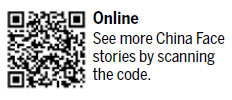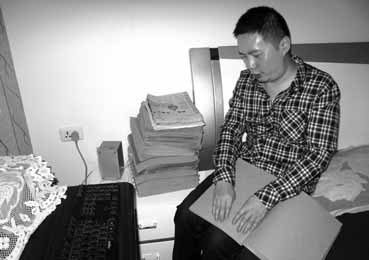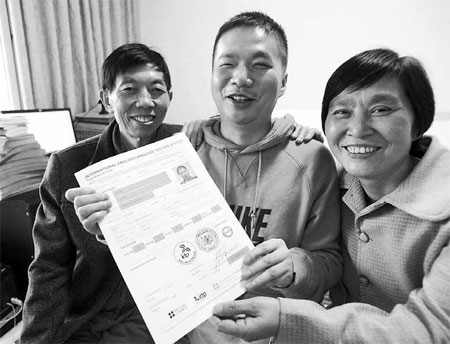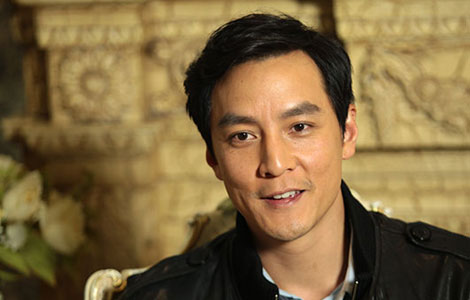Beyond massage
Updated: 2013-10-22 07:25
By Luo Wangshu and Ji Jin (China Daily)
|
|||||||||||
One determined student stepped off the traditional career path for blind people in China, and now savors a new life at university in Britain, Luo Wangshu and Ji Jin report.
Being a massage therapist is a perfect job for many people with a visual disability, but for Zheng Jianwei, it was far from enough.
The 30-year-old former massage therapist quit his hospital job in 2009 to prepare for admission to graduate school.
After about four years' endeavor, Zheng successfully gained an offer from the University of Essex in the United Kingdom and became a graduate student this month.
He took IELTS, the language-fluency test essential for university admission in the UK, in 2012 and scored 6.5 points, winning him offers from several universities in the UK, including Essex. He was the first vision-disabled examinee to take the IELTS in the Southwest Chinese region.
"I always want to learn more. Although people say that as a blind person, you should feel satisfied to have a decent and secure job and to be able to feed yourself. But I don't want to give in so easily. Something deep in my heart is still burning and yelling, saying 'Pursue your dream!'," Zheng says.
However, Zheng's path to graduate school was not easy.
"I can't take China's national entrance exam for graduate school, which doesn't provide a version for blind students," he says.
He then turned to search for graduate schools overseas. However, English became his nightmare.
Zheng studied in special schools for visually challenged students since primary school, but foreign language was never a main subject.
Prior to quitting his job and resuming studies to learn English in 2009, Zheng only knew the alphabet, a few words and some basic expressions. "Resuming learning English in my late 20s is not easy," he says.
It took him three years of intensive study to gain entrance to a graduate school overseas.
Because the lack of study materials, Zheng needs to spend hours and days scanning textbooks for the visually disabled and copying them, while it may take only five minutes for a sighted person to order a plain English textbook from Amazon.
Wearing a plaid shirt and blue jeans, Zheng sits in front of his computer "reading" websites. When he moves the mouse, the text is read aloud by a special software program. His bedroom is filled with books and newspapers, as well as a computer, on which he spends the majority of his time, and describes it as "the main source to know the world". He also downloads oral study materials online.
"This is my English textbook, New Concept English," he says, picking it out from the stack. The Braille book is only literate to him; from an outsider's eyes, it is paper with nearly invisible dots punched into it.
In his parents' eyes, Zheng has been a sensible, independent and decisive man from a young age.
Zheng made all the major decisions by himself, including studying abroad and choosing majors.
"We just follow his decisions," the mother says.
Born and raised in a small town in east Chongqing municipality Qianjiang, Zheng has never had the chance to see light or color. He was diagnosed as totally blind at birth.
With his first seven years spent in the small town, Zheng started his formal education at the Chongqing School for the Blind, the only special school for the visually impaired in the city, offering children education from first grade to junior high school. Due to the three hours required for travel from his hometown to the school, Zheng was enrolled as a boarding student. "The majority of my schoolmates become massage therapists after graduation from junior high school. This occupation seems to be the only way for our blind people to feed ourselves," he says.
Zheng refused such "so-called destiny".
"I do not hate to be a therapist. But as a teen, I wanted to fight against the 'fate to be a therapist', when everybody told you that in China, it is the only way out for the blind," he says.
After graduation, he went to Qingdao to continue his senior high school, aiming for universities.
"It was the only school for the blind offering ordinary senior high school education then," he says. So the 15-year-old boarded in a city about 1,900 km from home.
However, when he completed high school studies and was preparing for college, he found that as a student with a visual disability, massage and acupuncture was the only major available to him.
"I returned to the 'right track' for the blind," says Zheng, who had no other choice but to become a college student at Changchun University in 2001.
After gaining a bachelor's degree in massage and acupuncture, Zheng entered Qianjiang Hospital of Traditional Chinese Medicine, as a physical therapist, which he quit after three years' practice.
He was ready to try something else.
"From a young age, we have been categorized and put into special schools. I hope I can mingle with 'mainstream' society, and I believe that I have the ability," he adds.
"In some developed countries, people with disabilities are treated like anyone else," says Zheng. For example, when he took the IELTS, he had received assistance such as special paper and typing software from the British consulate in Chongqing.
Chen Bing, acting area director in Southwest China for the cultural and education section of the British consulate-general, told China Daily that IELTS design is based on the UK's education system that advocates inclusive education. It is a "test shaped by your needs", he says, adding that IELTS has provided a special exam for 140 special-needs candidates since 1989 in China including 26 with visual disability.
While special schools for students with special needs are discouraged, they are the only way for such students in China to get an education.

Students are isolated in a small group instead of interacting with ordinary peers. They may live in a small group at school and then live in a small world forever, says Lu Jun, a Beijing lawyer who is also a visiting researcher at the Chinese University of Hong Kong, specializing in rights for disabled people.
A report by the China Disabled Persons' Federation released in September shows 28 percent of school-aged children with disabilities in China still cannot be enrolled at school, compared with their able-bodied peers, who have a 99.85 percent enrollment rate.
"In the higher education system, students with special needs lack access to institutes. Schools only give exam catering to 'ordinary' students without assisting students with special needs. How can disabled students get in?"
Zheng, as a lucky one, is busy with his new life in Essex. He says he doesn't have a long-term goal for life - instead he copes with it and enjoys it by setting one modest goal after another. The most pressing one is to find the way between his apartment and school. "They are about 1 mile apart," he says.
Contact the writers through
luowangshu@chinadaily.com.cn.
|
Above: Zheng Jianwei and his parents show Zheng's IELTS result that successfully earned the young man the offer from the University of Essex in the UK. Below: Zheng learns from his Braille English textbook, New Concept English. Photos Provided to China Daily |

(China Daily 10/22/2013 page20)
Today's Top News
UK official looks to China for support
Economy to see 'good ending' in Q4
Teacher killed in US school shooting
Border agreement to boost ties
US OKs Alibaba structure
Beijing works to spur global development
Scientists requested government to plant GM crops
Travelers to Europe bypass attractions of Brussels
Hot Topics
Lunar probe , China growth forecasts, Emission rules get tougher, China seen through 'colored lens', International board,
Editor's Picks

|

|

|

|

|

|






